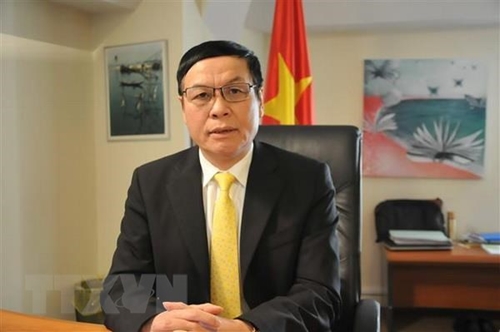In his interview granted to the press on the occasion of the European Council’s June 25 decision to entrust the European Commission to sign the two deals with Vietnam in Hanoi on June 30, the diplomat said that they are the first new-generation trade and investment deals that the EU has reached with a middle-income country.
    |
 |
|
Head of the Vietnamese mission to the EU Vu Anh Quang |
The deals, once signed and ratified, will bring about huge benefits to both sides, as their economic products do not compete, but complement each other.
With 99 percent of tariff lines to be removed, the EVFTA will create favorable conditions for Vietnam’s goods to access the 512-million-consumer EU market.
Two-way trade hit USD 55 billion in 2018 and will surely surge in the time ahead, Quang said, adding that European enterprises will also intensify investment in Vietnam, especially in the fields the EU has strength such as high technology, clean energy, finance-banking, transportation and logistics, thus helping Vietnam in economic restructuring and growth model shifting in an inclusive and sustainable manner.
Quang, who is also Vietnamese Ambassador to Belgium, said that on June 25 last year, the two sides had reached a high consensus on all contents of the two agreements.
In the past year, Vietnam has exerted efforts to canvass the EU to speed up internal procedures of the deals. The canvass work has been conducted in not only Hanoi, but also capital cities of EU member states and at international conferences at all levels.
As a result, the two deals were adopted by the European Commission on October 17, 2018 and by all EU member states at the council’s meeting on June 25, 2019.
Regarding the ratification process, the diplomat stated that after the signing ceremony, both sides will conduct procedures for their parliaments’ ratification.
For the Vietnamese side, relevant committees of the National Assembly will study and contribute ideas to submit the two documents to the legislature for approval in line with the ratification process of international treaties.
The ratification process of the EU is more complicated. The EVFTA will become effective after it is ratified by the Vietnamese NA and the European Parliament, while the EVIPA will take into effect after it is ratified by the Vietnamese NA and the European Parliament, and the legislative bodies of 28 member states, Quang said.
He expressed his hope that the European Parliament in the new tenure will soon stabilize its organisation and personnel to vote for the ratification of the two documents in late 2019 or early 2020.
Source: VNA